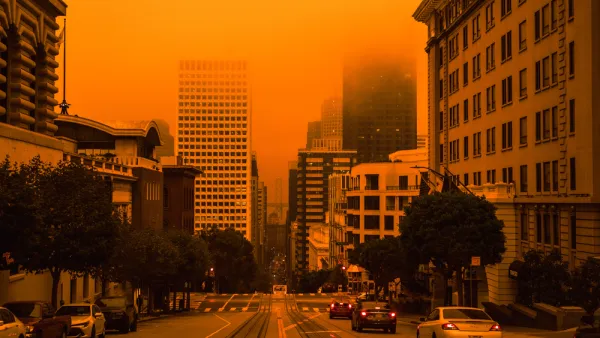This evening my wife, Beth Conover, will appear on a televised panel discussion on "Immigration and Sustainability" aired on Rocky Mountain PBS's Colorado State of Mind, hosted by Greg Dobbs. The panel includes former Gov. Dick Lamm, former Post columnist Diane Carman, and State Rep. Michael Garcia (D-Aurora). An mp3 of the program is already available at the following link.
This evening my wife, Beth Conover, will appear on a televised panel discussion on "Immigration and Sustainability" aired on Rocky Mountain PBS's Colorado State of Mind, hosted by Greg Dobbs. The panel includes former Gov. Dick Lamm, former Post columnist Diane Carman, and State Rep. Michael Garcia (D-Aurora). An mp3 of the program is already available at the following link.
My wife worked for Denver Mayor John Hicklooper and created the Greenprint Denver program. The topics being discussed are immigration and sustainability and to what extent these issues are linked. While, immigration is a real issue that will require new policies and creative thinking, I would argue it is the weapon of mass distraction when it comes to thinking about what needs to be done to make the U.S. more sustainable.
The League of Conservation Voters recently did an analysis of all the Presidential debates on national TV ("What Are They Waiting For?", League of Conservation Voters). In total, 2,679 questions were asked at Republican and Democratic debates. Of the, 2,679 questions, illegal immigration was the topic of 165 questions while the words global warming and climate change came up less than 25 times. The words "global warming" actually tied with questions about UFOs (three times). Arguing that immigration is an environmental issue while ignoring climate change is like focusing on the energy consumed by the light bulb in your refrigerator while keeping the door open.
As planners, we need to incorporate global warming into our work. The way we plan our cities and towns has a major impact on our energy footprint, whether it's creating communities that support alternative modes of transportation, building energy efficient homes and buildings, or planting trees and protecting open space as carbon sinks, planning impacts energy use for decades.
The Presidential Climate Action Project recently issued a 10 page Presidential Climate Action Plan, encouraging the next president to focus more seriously on climate change. The report states:
We must recognize that national climate policy and national energy policy are inextricably linked. The United States must make a deliberate and rapid transition away from carbon-based fuels, whether they come from the Persian Gulf or from domestic sources. We must turn with unprecedented speed to a future of energy independence, resource efficiency, renewable energy technologies and low-carbon fuels. Public policy must support only those technologies and resources that simultaneously stabilize the climate and enhance national energy security.
We must acknowledge that global climate change is much more than an environmental issue. It is a threat to national security because an unstable world is a breeding ground for extremism and terrorism. It is an urgent economic issue in which the price of action is much less than the costs of delaying, or doing nothing.
We must recognize not only the threat of climate change, but the enormous opportunities that we can capture by addressing it. The urgent worldwide demand for clean energy technologies is arguably the greatest entrepreneurial opportunity the United States has ever known. As the world's leading innovator, we can and should become the world's leading supplier of the technologies and products that will help all people in all nations achieve dignity and a decent standard of living, without contributing to climate change.
I couldn't agree more, and yet immigration is getting a disproportionate share of attention when it comes to discussions about national security, the environment, and sprawl. Smart Growth America conducted a study to investigate the linkages between sprawl, immigration, and population growth. Less than a third of sprawl development can be attributed to population growth (natural, legal immigration, and illegal immigration combined). Sprawl and its negative impact on the environment is mainly an issue of poor planning and the developer interest in building large lot single family houses. As planners and citizens we help keep the focus on issues of more long-term strategic importance.

Analysis: Cybertruck Fatality Rate Far Exceeds That of Ford Pinto
The Tesla Cybertruck was recalled seven times last year.

National Parks Layoffs Will Cause Communities to Lose Billions
Thousands of essential park workers were laid off this week, just before the busy spring break season.

Retro-silient?: America’s First “Eco-burb,” The Woodlands Turns 50
A master-planned community north of Houston offers lessons on green infrastructure and resilient design, but falls short of its founder’s lofty affordability and walkability goals.

Test News Post 1
This is a summary

Analysis: Cybertruck Fatality Rate Far Exceeds That of Ford Pinto
The Tesla Cybertruck was recalled seven times last year.

Test News Headline 46
Test for the image on the front page.
Urban Design for Planners 1: Software Tools
This six-course series explores essential urban design concepts using open source software and equips planners with the tools they need to participate fully in the urban design process.
Planning for Universal Design
Learn the tools for implementing Universal Design in planning regulations.
EMC Planning Group, Inc.
Planetizen
Planetizen
Mpact (formerly Rail~Volution)
Great Falls Development Authority, Inc.
HUDs Office of Policy Development and Research
NYU Wagner Graduate School of Public Service





























